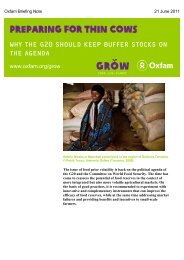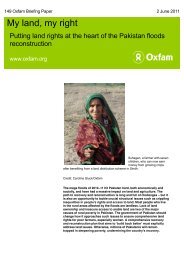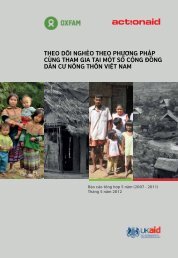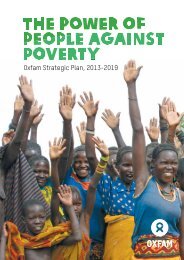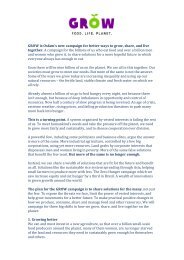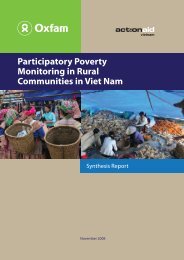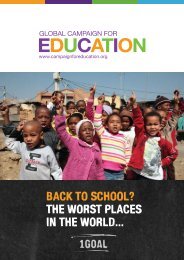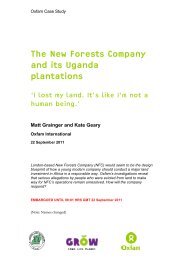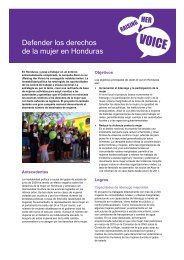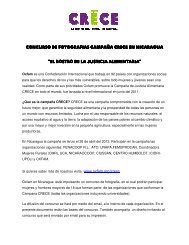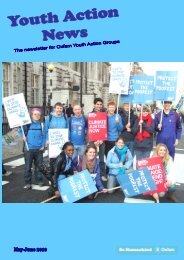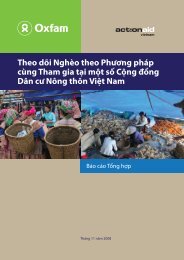Challenges to Rural Poverty Reduction in Viet Nam - Oxfam Blogs
Challenges to Rural Poverty Reduction in Viet Nam - Oxfam Blogs
Challenges to Rural Poverty Reduction in Viet Nam - Oxfam Blogs
You also want an ePaper? Increase the reach of your titles
YUMPU automatically turns print PDFs into web optimized ePapers that Google loves.
Participa<strong>to</strong>ry poverty moni<strong>to</strong>r<strong>in</strong>g <strong>in</strong> rural communities <strong>in</strong> <strong>Viet</strong> <strong>Nam</strong><br />
52<br />
Organizational<br />
meet<strong>in</strong>gs/<br />
activities<br />
Periodical,<br />
depend<strong>in</strong>g<br />
on each<br />
organization<br />
3 2 2 3 4 The poor can easily<br />
exchange <strong>in</strong>formation <strong>in</strong><br />
small groups<br />
Newspapers,<br />
magaz<strong>in</strong>es<br />
Provided<br />
free of<br />
charge<br />
2 1 1 2 1 Many poor people are<br />
illiterate, not <strong>in</strong>terested <strong>in</strong><br />
small-typed <strong>in</strong>formation<br />
Leaflets,<br />
brochure<br />
distributed <strong>to</strong><br />
households<br />
Very few,<br />
depend<strong>in</strong>g<br />
on each<br />
programme/<br />
project<br />
1 2 1 1 1 Beautifully pr<strong>in</strong>ted<br />
<strong>in</strong>formation, can be kept<br />
(hung, posted at home)<br />
Many poor people are<br />
illiterate<br />
Announcements<br />
at commune<br />
centres, public<br />
places<br />
When there<br />
is new <strong>in</strong>formation<br />
2 1 1 1 1 Not very attractive<br />
formats<br />
Many poor people are<br />
illiterate, very rarely go <strong>to</strong><br />
commune headquarters<br />
Word of mouth Regular 2 2 3 2 2 Information is <strong>in</strong>formal,<br />
often biased when<br />
passed on from one<br />
person <strong>to</strong> another<br />
Group meet<strong>in</strong>gs<br />
Periodical,<br />
extraord<strong>in</strong>ary<br />
SOURCE: Men and women group discussions <strong>in</strong> surveyed sites, 2011<br />
3 3 2 4 5 Small scale, easy <strong>to</strong><br />
organize<br />
The poor feel confident<br />
<strong>to</strong> participate<br />
Village meet<strong>in</strong>gs are ranked highest for “more <strong>in</strong>formation”, “larger audiences”,<br />
“meets needs” and “two-way exchanges”. Information provided <strong>in</strong> village meet<strong>in</strong>gs<br />
is often related <strong>to</strong> general community issues, Government policies, and on-go<strong>in</strong>g<br />
programmes and projects <strong>in</strong> the village. Other <strong>in</strong>formation provided concerns agricultural<br />
extension, employment, labour export, laws and health issues. The percentage of<br />
household representatives attend<strong>in</strong>g village meet<strong>in</strong>gs is often between 50 and 60%<br />
and <strong>in</strong> some places 80-90%. In some villages (Ban Lien-Lao Cai, Thanh Xuong-Dien Bien,<br />
and Luong M<strong>in</strong>h-Nghe An ) people who do not attend the village meet<strong>in</strong>gs are f<strong>in</strong>ed.<br />
In Ban Lien-Lao Cai, some Tay villages have even elected a “village liaison” officer <strong>to</strong><br />
<strong>in</strong>vite villagers <strong>to</strong> meet<strong>in</strong>gs. In ethnic m<strong>in</strong>ority villages, commune officials often take<br />
part <strong>in</strong> meet<strong>in</strong>gs <strong>to</strong> communicate and expla<strong>in</strong> policies that affect the village. The village<br />
head can communicate <strong>in</strong> local languages, so it is easier for the poor and women <strong>to</strong><br />
understand.<br />
Mass organizational and group meet<strong>in</strong>gs are a form of two-way <strong>in</strong>formation<br />
exchange. Mass organizational meet<strong>in</strong>gs are a chance <strong>to</strong> share <strong>in</strong>formation on<br />
organizational movements and family advantages and disadvantages. Group meet<strong>in</strong>gs<br />
are very effective <strong>in</strong> populated villages or isolated population clusters. The group leader,<br />
after receiv<strong>in</strong>g <strong>in</strong>formation from the village management, shares it with group members.<br />
Participants <strong>in</strong> group meet<strong>in</strong>gs often live <strong>in</strong> the same neighbourhoods and rout<strong>in</strong>ely<br />
<strong>in</strong>teract with each other, so are very active <strong>in</strong> discussion and tend not <strong>to</strong> discrim<strong>in</strong>ate<br />
between wealthy and poor households. Many poor people feel confident <strong>to</strong> express<br />
their own views and op<strong>in</strong>ions.<br />
Television is assessed as an <strong>in</strong>formation channel with large audiences. The<br />
proportion of households with a TV set is <strong>in</strong>creas<strong>in</strong>g. Ethnic m<strong>in</strong>orities who cannot<br />
speak <strong>Viet</strong>namese can watch VTV 5, the ethnic m<strong>in</strong>ority language channel of <strong>Viet</strong><br />
<strong>Nam</strong> Television, or prov<strong>in</strong>cial TV channels broadcast <strong>in</strong> local languages. Information<br />
dissem<strong>in</strong>ated over TV is very diverse, however, it tends <strong>to</strong> be quite general and not<br />
always relevant <strong>to</strong> local people.



